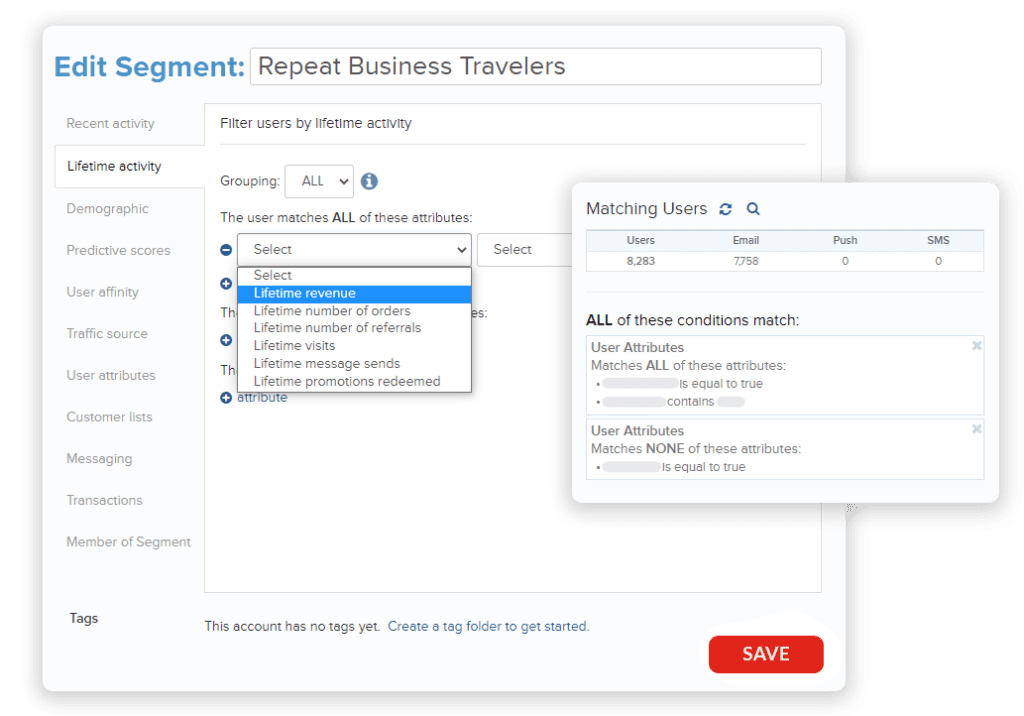You put a lot of work into creating engaging and relevant email promotions for your guests. But the big question is: who are you sending that message out to?
Not every message is the right fit for every guest. Segmentation is a central component of your marketing efforts, whether you’re communicating via email or text. It is the process of dividing up your guests into specific lists based on different attributes. Segmentation ensures the right message is going to the right audience.
Every marketer needs to do this. However hotels have very specific use cases. Some examples of email segmentation for hotels include:
- All previous guests
- Previous guests who stayed during a specific time of year
- Previous guests who stayed during a specific time of year and spent over a certain threshold
- Or, guests currently at the property for text message marketing
And so on! Slicing and dicing your marketing to create specific, targeted email campaigns will yield higher results than sending out the same message to a lot of people.
Why segmentation is important
There are many reasons why it’s important to segment your guests before you start marketing to them. Doing so will help you better understand your guests and better understand their spending patterns. It is helpful to understand exactly how many guests you have that fit specific profiles, and whether or not those guests are emailable.
What’s more, it will also make your marketing more impactful as you can target your message to a specific audience.
Creating a marketing campaign is a lot of work. Having good guest segmentation will have a higher ROI for your marketing overall. Sending a targeted message out to a small group that is more likely to convert will yield better results than a general one to a large group. If you send out a generic blast email to every single person in your database, you may get some results. But you’ll also get more unsubscribes than you would with targeted, personalized messaging. All of those unsubscribed guests will never hear from you again, hurting your marketing efforts in the long run.
Understanding segmentation for email marketing
You probably already have some guest segmentation knowledge from your overall revenue management strategy. Now it’s time to bring your understanding of your transient, corporate, group, or other market segments to your email marketing.

Use your knowledge of your market to increase the lifetime value of each guest through email marketing. It is the best way to reengage past guests—but to do so, you need to decide who you’re sending what. That’s where segmentation comes into play.
For example, if there’s a regular conference or networking event in your area, target travelers who stayed at your hotel during past events with a targeted campaign. Increase revenue by marketing your meeting rooms to those guests at a discounted rate. Or, target past leisure guests with spa, restaurant, or similar offerings. Email marketing is a great way to increase revenue without just offering discounted room rates and impacting your ADR.
Use your knowledge of your market segmentation to inform your overall email marketing plan. But in order to do any of this well, the big question is how you store and use that information.
Email segmentation technology for hotels
When looking for a platform to send marketing emails, hotels should invest in one that has key features and functionality that serve the hospitality industry. Your email automation system should connect to your property management system. This will allow you to send those all-important triggered emails before and after a guest’s stay. It will also allow you to leverage guest profile information in order to create segments.
Fuel Travel offers a Guest Messaging Solution that integrates with most property management systems. With a PMS integration, you can create customizable, specific market segments based on your guest data.
Here are some guest segments and ideas on how to market to them.
Guest activity
Segment your guest database based on past guest activity and target specific groups of guests based on their value to your hotel.
With a full PMS integration, you can leverage data such as length of stay or total spend in order to target to big-spender guests with a multi-night discount. You can also send emails out based on guest activity prior to a stay by writing a more impactful hotel welcome email.
Booking behavior and history
Automatically market to guests based on when they stayed with you in the past. Reach out to guests based on their past seasonality.
Guests who visit in the summer are more likely to visit in the sunny months in the future. Use your PMS + GMS integration to pull a list of guests who stayed between June and August and send them a message a few months prior when they’re likely in the planning stages of their summer vacation. Remind them about the amazing stay they had in the past and offer a related upgrade or promotion.
Demographics
Speak to the right guests with information they care about. Email marketing is all about sending relevant information. The more precise you can be, the more likely guests are to open the email and to stay subscribed for future guests.
Segment your lists based on demographic data. Remind senior guests of your senior discounts. Target people who live within driving distance with a “staycation” offer or a promotion related to your amenities.
Attributes such as interest in specific events
Recurring events in your area are essential to keeping hotel rooms filled. Email marketing should be part of that strategy in order to boost occupancy. Reach out to past guests who previously visited your area for the event with a reminder of their past stay with you.
Get this data from your PMS from guests who previously visited as part of a related group booking. Or email guests who stayed within the window of time that the event occurred with a relevant, tailored message that sparks their interest and brings them back to your hotel.
Specific amenities
Let your amenities guide your email marketing plans! Segment guests based on their past interest in specific amenities at your hotel. For example, if a guest booked any special add-ons related to your pool, like additional towels in addition to their nightly rate, you should be able to read this from your PMS and segment out travelers to market to based on that. Larger amenities, such as a spa or F&B are also essential in your email marketing segmentation.
Another strategy is to emphasize amenities based on seasonality– remind past summer-time guests about the amazing time they had at your pool, or paint a picture for winter travelers of the coziness of our lobby bar.
Reach out to past visitors at your on-site dining and provide a free drink or similar coupon with a multi-night booking. Segmenting guests based on amenities is an excellent way to remind people about their overall experience at your hotel and put you on their radar for their next vacation.
And so much more
This is just the start of hotel email segmentation. Your hotel’s specific audience, history, and location will also dictate ways you can slice and dice your database of past guests. A key to email marketing is to provide relevant, timely messages to ensure that guests feel like you’re talking specifically to them and their interests. Guests are more likely to open an email, click the contents, and potentially book, if the content feels personal to them.

Segmenting your hotel email marketing campaigns based on precise, hotel-specific parameters is the difference between success and failure. If you’re evaluating an email marketing system, consider one that has these important hotel integrations
Fuel GMS helps hotels create impactful marketing campaigns. Connect to your existing technology and create beautiful emails in a drag-and-drop template maker. Learn more about Fuel GMS’ complete email marketing solution here. For a demo of our system, contact us today!






